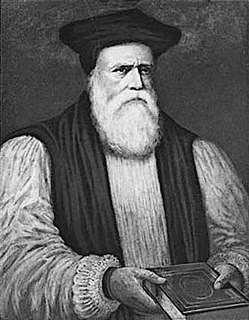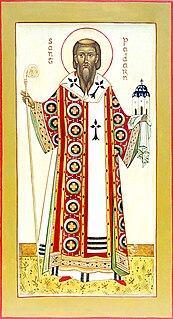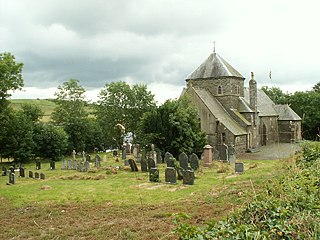
Thomas Huet (died 19 August 1591) was a Welsh clergyman and translator of the Bible.

Thomas Huet (died 19 August 1591) was a Welsh clergyman and translator of the Bible.
Huet, who was probably from Brecknockshire, Wales originally, is recorded as being a member of Corpus Christi College, Cambridge in 1544. [2] He was Master of the College of the Holy Trinity, Pontefract when it was dissolved. Between 1559 and 1565, he was appointed to various church livings: he became rector of Cefnllys and Llanbadarn Fawr, both in Radnorshire, and also prebendary of Llanbadarn Trefeglwys and Ystrad, both in Ceredigion. He was precentor of St David's Cathedral from 1562 to 1588. Richard Davies, Bishop of St David's, recommended that Huet be appointed bishop of Bangor but this did not take place. Huet assisted Richard Davies and William Salesbury in the translation into Welsh of the New Testament in 1567, particularly the Book of Revelation. [3] In 1571, Huet was named in the charter granted by Queen Elizabeth I as one of the eight founding fellows of Jesus College, Oxford. [4]
Huet died in 1591 and was buried in the church at Llanafan Fawr church in Brecknockshire. [3]

William Morgan was Bishop of Llandaff and of St Asaph, and the translator of the first version of the whole Bible into Welsh from Greek and Hebrew.

Thomas Rotherham, also known as Thomas (Scot) de Rotherham, was an English cleric and statesman. He served as bishop of several dioceses, most notably as Archbishop of York and, on two occasions as Lord Chancellor. He is considered a venerable figure in Rotherham, South Yorkshire, his town of birth.

Aberystwyth University is a public research university in Aberystwyth, Wales. Aberystwyth was a founding member institution of the former federal University of Wales. The university has over 8,000 students studying across 3 academic faculties and 17 departments.

In Christianity, a collegiate church is a church where the daily office of worship is maintained by a college of canons: a non-monastic or "secular" community of clergy, organised as a self-governing corporate body, which may be presided over by a dean or provost. In its governance and religious observance a collegiate church is similar to a cathedral, although a collegiate church is not the seat of a bishop and has no diocesan responsibilities. Collegiate churches were often supported by extensive lands held by the church, or by tithe income from appropriated benefices. They commonly provide distinct spaces for congregational worship and for the choir offices of their clerical community.

Parts of the Bible have been translated into Welsh since at least the 15th century, but the most widely used translation of the Bible into Welsh for several centuries was the 1588 translation by William Morgan, Y Beibl cyssegr-lan sef Yr Hen Destament, a'r Newydd as revised in 1620. The Beibl Cymraeg Newydd was published in 1988 and revised in 2004. Beibl.net is a translation in colloquial Welsh which was completed in 2013.
Hugh Lloyd was a Welsh cleric who was the Anglican bishop of Llandaff from 1660 until his death in 1667.

Llanafan Fawr is a village and community and ecclesiastical parish in the former cantref of Buellt (Builth) and historic county of Brecknockshire in Wales. It is now part of Powys. The community includes the former parish of Llanfihangel Bryn Pabuan.

Saint Padarn's Church is a parish church of the Church in Wales, and the largest mediaeval church in mid-Wales.
This article is about the particular significance of the century 1601–1700 to Wales and its people.
This article is about the particular significance of the century 1501–1600 to Wales and its people.

Padarn was an early 6th century sanctified British Christian abbot-bishop who founded St Padarn's Church in Ceredigion, Wales. The first bishop of Braga and Saint Paternus of Avranches in Normandy appear to be the same person. Padarn built a monastery in Vannes and is considered one of the seven founding saints of Brittany. Padarn's early vita is one of five insular and two Breton saints' lives that mention King Arthur independently of Geoffrey of Monmouth's Historia Regum Britanniae.

Saint Afan of Builth was an early 6th-century Welsh bishop, martyr, and saint. His feast day is generally placed on 17 November, although the Demetian Calendar formerly used in southern Wales placed it on the 16th; it is no longer observed by either the Anglican or Catholic church in Wales.
William Thomas Havard MC was a Welsh First World War military chaplain and rugby union international player who was later bishop of two dioceses of the Church in Wales: first as the Bishop of St Asaph and then the Bishop of St David's.
Richard Meredith was the Church of Ireland Bishop of Leighlin from 1589 until his death.
Roy Thomas Davies was a Welsh Anglican clergyman, who served as Bishop of Llandaff from 1985 to 1999.

Bont Goch is a village in Ceredigion, Wales, 2 miles (3.2 km) northeast of Aberystwyth. With Talybont, it is in the community of Ceulanamaesmawr.

Thomas Ragon was the eighth Abbot of Vale Royal Abbey, Cheshire. His term of office lasted from 1351 to 1369. His abbacy was predominantly occupied with recommencing the building works at Vale Royal—which had been in abeyance for a decade—and the assertion of his abbey's rights over a satellite church in Llanbadarn Fawr, Ceredigion, which was also claimed by the Abbot of Gloucester.
This article is about the particular significance of the year 1712 to Wales and its people.